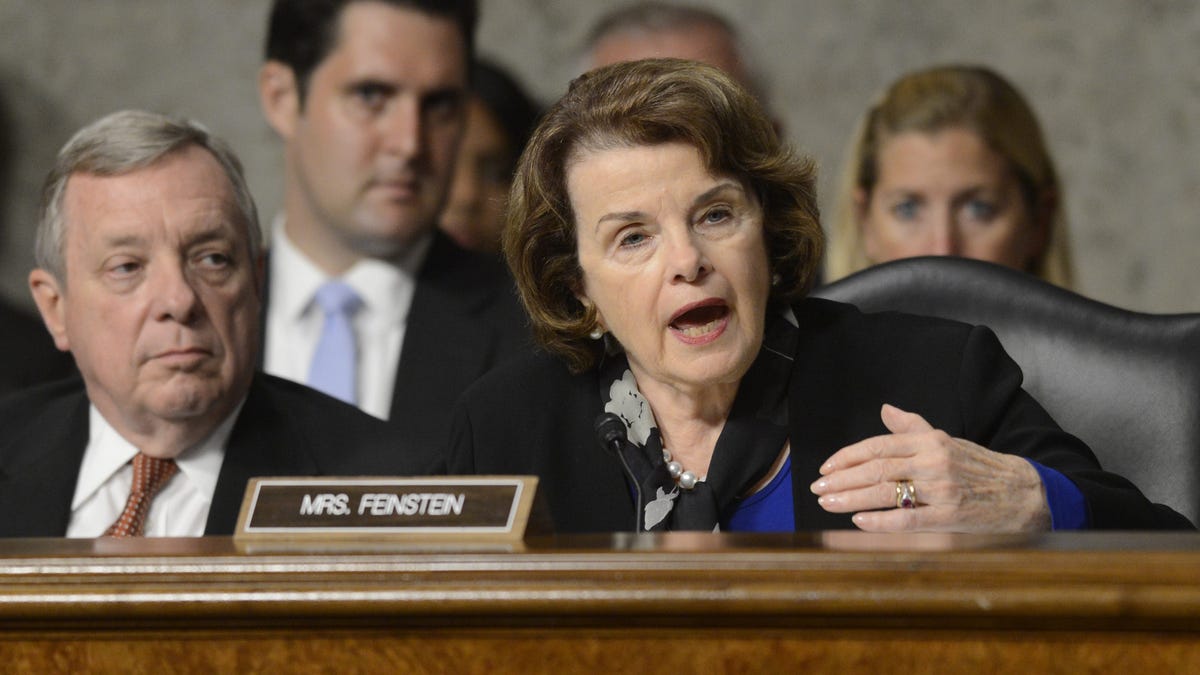Silicon Valley urged to step up efforts to fight terrorism
As extremists take terrorism online, the US and tech companies don't agree on what to do. The tech industry says it's doing all it should.

A new bill would require companies to share online terrorist activity with the federal government. Proposed by Sen. Dianne Feinstein (D-CA), pictured here at the US Senate Appropriations Committee hearing on cybersecurity in 2013, the bill received prompt criticism from tech trade organizations.
As terrorists cause havoc around the world, governments and law enforcement agencies are ratcheting up pressure on Twitter, Facebook and others to take a more forceful stand in stopping extremists from using the Internet. But the US and the tech industry can't agree, with Silicon Valley saying there are limits to its ability to tamp down on online services.
While President Barack Obama and former Secretary of State Hillary Clinton try to fight an enemy that's mastered social media, Twitter and Facebook say it's unrealistic and impossible to do more than they are already without violating free speech and privacy rights.
"Violent threats and the promotion of terrorism deserve no place on Twitter and our rules make that clear," a spokesman for the San Francisco-based social networking site said Tuesday. "We have teams around the world actively investigating reports of rule violations, and they work with law enforcement entities around the world when appropriate."
Tech companies like Apple don't want to bend their privacy rules in the name of national security. Despite frequent calls from US authorities for backdoor access to encrypted communications, which scramble messages so they can only be read by intended recipients, Apple and others in Silicon Valley have kept that door firmly closed.
In a letter this May, Twitter, Apple, Adobe and 137 others argued that letting the government break into encrypted messages weakens the tech. In response to a request for comment, Apple referred to its previous statement that "everyone has the right to privacy and security."
More accounts for terrorist groups are popping up, despite social media companies' efforts to take them offline. That shows just how difficult it is to keep determined groups from using these services. A group calling itself Asawitiri Media, for example, keeps creating new accounts that get around Twitter's safeguards. When it does get online, the group often mocks Twitter for trying to stop its activities, the New York Times reported Tuesday.
Facebook also flags terrorist communications. "If we become aware of a threat of imminent harm or a planned terror attack, our terms permit us to provide that information to law enforcement and we do," said a spokesperson for the world's largest social networking site.
Now, just two days after President Obama's primetime address from the Oval Office put the extremist group ISIS front and center, US Sen. Dianne Feinstein is reviving an effort to require companies to report terrorist activity online to the government.
"That information can be the key to identifying and stopping terrorist recruitment or a terrorist attack, but we need help from technology companies," Feinstein, a Democrat from California, said in a statement Tuesday.
Debates about backdoors for encrypted messages are heating up since the fatal attacks in Paris, Beirut, Mali and San Bernardino, California, in the past few weeks. The pressure isn't abating. "The volume seems to have been turned up," Mark MacCarthy, vice president of public policy at the Software and Information Industry Association (SIIA), said in an interview.
Feinstein's new bill requires any online service "engaged in providing an electronic communication service or a remote computing service to the public" to make reports to the government on terrorist activity.
That includes the "distribution of information relating to explosives, destructive devices, and weapons of mass destruction." The bill, at just over two pages, doesn't say what else might trigger the requirement to report online activity to the US.
Feinstein first tried to pass the bill into law as part of the Senate's intelligence budget earlier this year, but Sen. Ron Wyden, a Democrat from Oregon, blocked it because he was worried it would lead to unnecessary surveillance.
With the reporting requirement back on the table, the SIIA and other organizations representing tech companies are pushing back. MacCarthy said the bill would sacrifice privacy without providing any real benefit.
"The desire to do something, particularly in the wake of recent attacks, should not lead Congress to put more innocent people under government surveillance, without any evidence it would make us safer," MacCarthy said in a written statement.
Eva Galperin, a global policy analyst at the Electronic Frontier Foundation, agrees. "Once it becomes the company's job to look over every user's shoulder and judge whether or not what they are saying is sign of intent to commit terrorism or radicalization, things get problematic."
Terry Collins, Ian Sherr and Shara Tibken contributed to this report.

